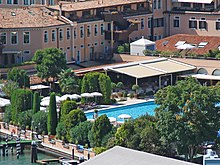Belmond Hotel Cipriani
| Belmond Hotel Cipriani | |
|---|---|
 | |
 | |
| Hotel chain | Belmond |
| General information | |
| Town or city | Giudecca, Venice |
| Country | Italy |
| Coordinates | 45°25′34″N 12°20′28″E / 45.4261°N 12.3411°E |
| Named for | Giuseppe Cipriani |
| Opened | 1958 |
| Other information | |
| Number of rooms | 96 |
| Website | |
| www | |
The Belmond Hotel Cipriani is a deluxe hotel on the island of Giudecca in Venice, northern Italy. It is reached by hotel launch from St Mark's Square, a five-minute journey across the lagoon.[1] Long considered one of the leading luxury hotels of the world, its room rates begin at USD $1,400 per night.
History
[edit]
The hotel was opened in 1958 by Giuseppe Cipriani, founder of Harry’s Bar in Venice and inventor of the Bellini cocktail. As well as Giuseppe Cipriani, the partners in the joint company were the three daughters of the 2nd Earl of Iveagh, who provided the financing. The three sisters—Viscountess Boyd of Merton, Lady Honor Svedar and Lady Brigid Guinness—each had a suite designed for themselves and their families. Rooms were decorated with Venetian furnishings, including Murano glass chandeliers, Fortuny fabrics and Venetian artworks.
The hotel achieved instant acclaim. In 1962, the Earl asked Giuseppe Cipriani to rebuild and manage the Hotel Belvedere on his property in Asolo; this was reopened as the Hotel Villa Cipriani.[2] In 1968, some adjoining land was purchased and a 600-meter Olympic-sized swimming pool (the only pool in central Venice)[3] was added among gardens.
In 1976, the Hotel Cipriani was purchased for £900,000[4] by Sea Containers, which established a leisure division named Orient-Express Hotels Ltd.[5] The hotel subsequently expanded into the adjacent Palazzo Vendramin, a 15th-century palace facing the lagoon[6] and St Mark's Square. A restaurant, Cip's Club,[7] was built on a floating pontoon in the lagoon. In 1990, the adjacent Granaries of the Republic were opened as an event space.[8]
In 2014, the Hotel Cipriani was renamed the Belmond Hotel Cipriani as part of the rebranding of Orient-Express Hotels as Belmond.[9][10] In April 2014, the hotel opened Oro restaurant, designed by Adam Tihany, which in December 2015 was awarded a Michelin star.[11] George Clooney was married at the hotel.[12]
In fiction
[edit]Venice is the setting for the second half of the 1992 James Bond novel Death is Forever by John Gardner.[13] Bond flies into the Marco Polo Airport and is picked up by the Hotel's launch service. The Cipriani is located on the island of Giudecca and can only be reached by water. Several scenes take place at the hotel; Bond reserves a junior suite and later dines at the restaurant.
References
[edit]- ^ "telegraph.co.uk".[dead link]
- ^ Cipriani, Arrigo (2011). Harry's Bar: The Life and Times of the Legendary Venice Landmark. New York: Arcade Publishing.
- ^ "britishairways.com".
- ^ Sherwood, James B. (25 April 2012). books.google.co.uk. Biteback. ISBN 9781849543859.
- ^ "Orient-Express Hotels Ltd". Hospitality Online. Archived from the original on 4 February 2021. Retrieved 17 October 2014.
- ^ "Accommodations: Palazzo Vendramin Suites". Belmond Hotel Cipriani. Retrieved 28 May 2019.
- ^ "elleuk.com".[permanent dead link]
- ^ Sherwood, James B. (25 April 2012). books.google.co.uk. Biteback. ISBN 9781849543859.
- ^ "Orient-Express Hotels Ltd. to launch Belmond brand". Archived from the original on 2014-03-28. Retrieved 17 October 2014.
- ^ "Company Overview". Archived from the original on 20 October 2014. Retrieved 17 October 2014.
- ^ "Oro Restaurant". Michelin Guide. Retrieved 28 May 2019.
- ^ "LVMH agrees purchase of hotels group Belmond in $3.2bn deal". Evening Standard. Retrieved 09 January 2019
- ^ Gardner, John (1992). Death is Forever (1st ed.). Great Britain: Glidrose Publications. pp. 128–225. ISBN 0-340-54816-9.
External links
[edit]![]() Media related to Hotel Cipriani (Venice) at Wikimedia Commons
Media related to Hotel Cipriani (Venice) at Wikimedia Commons
